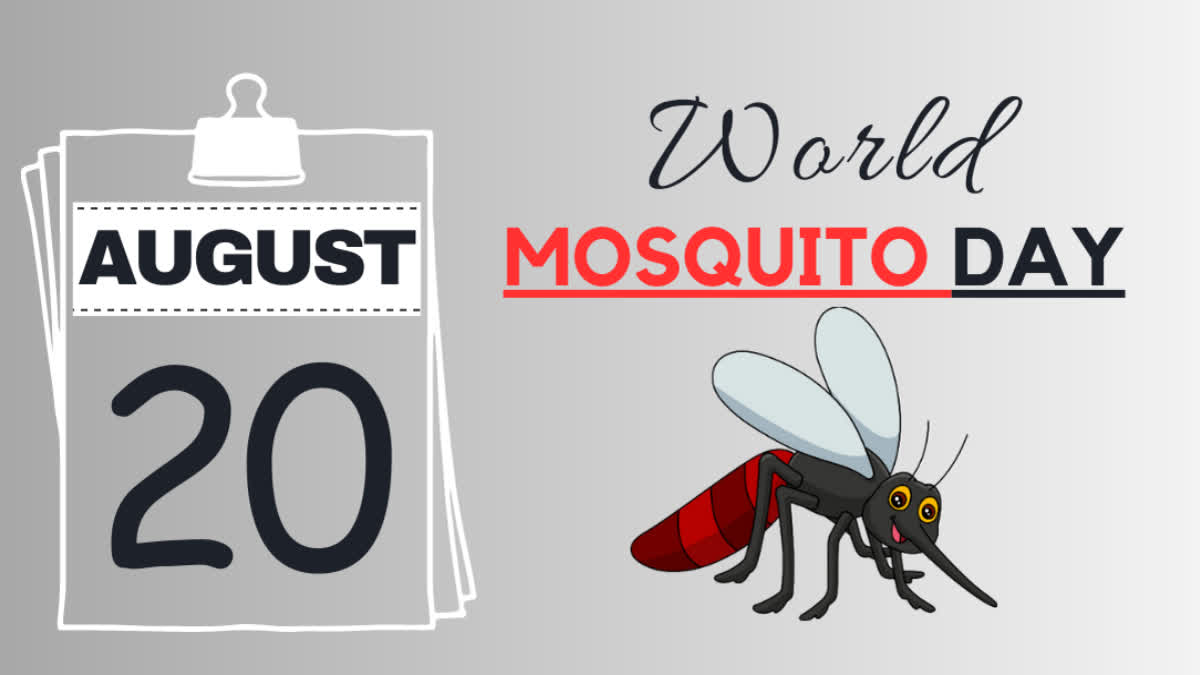Hyderabad: World Mosquito Day is observed every year on August 20th, with an aim to raise awareness about the threat posed by mosquitoes and the diseases they carry. August 20th is observed as Mosquito Day as this day marks the anniversary of Sir Ronald Ross's groundbreaking discovery in 1897, where he identified the link between mosquitoes and the transmission of malaria.
World Mosquito Day also emphasizes the importance of education and research on mosquitoes and the diseases caused by flying insects. Continued research helps us understand mosquito behaviour, develop new prevention methods, and discover innovative treatments. In recent years, technological advancements have played a significant role in the fight against diseases caused by mosquitoes. Rapid diagnostic tests, improved drug treatments, and ongoing vaccine research are all steps forward in reducing the disease's impact.
Mosquitoes are responsible for transmitting a range of diseases that can have severe health consequences. Some of the most severe diseases caused by mosquitoes are:
- Malaria: Malaria, caused by the Plasmodium parasite is a significant global health concern, which is transmitted through the bite of infected female Anopheles mosquitoes. Symptoms include fever, chills, fatigue, and sometimes severe complications. While there have been substantial efforts to control and eliminate malaria, the disease still claims hundreds of thousands of lives each year, mainly among young children and pregnant women. Mosquitoes, particularly the female Anopheles mosquitoes, are the primary vectors responsible for transmitting malaria.
- Dengue Fever: Dengue is a viral disease transmitted by Aedes mosquitoes. Symptoms include high fever, severe headache, joint and muscle pain, and rash for the viral disease which is mostly common in tropical and subtropical regions. There's no specific antiviral treatment, so supportive care is provided.
- Zika Virus: Zika Virus is also transmitted by Aedes mosquitoes, and can cause mild symptoms in some cases but is a significant concern for pregnant women due to its association with birth defects.
- Yellow Fever: Yellow fever, a viral disease transmitted by Aedes mosquitoes in tropical regions, can cause fever, jaundice, and organ failure.
- Chikungunya: Chikungunya is characterized by severe joint pain and is transmitted by Aedes mosquitoes. Treatment involves relieving symptoms through rest, fluids, and pain relievers.
- West Nile Virus: West Nile Virus, usually spread by Culex mosquitoes, can cause fever, headaches, and in severe cases, neurological symptoms.
- Japanese Encephalitis: Japanese Encephalitis is also transmitted by Culex mosquitoes, and can lead to inflammation of the brain.
Ways to prevent diseases caused by mosquitoes:
- Use Mosquito Repellent: Apply an Environmental Protection Agency(EPA)-approved mosquito repellent on exposed skin and clothing. An ideal Mosquito repellent should have ingredients like DEET, picaridin, or oil of lemon eucalyptus.
- Wear Protective Clothing: You should wear long-sleeved shirts, long pants, socks, and closed-toe shoes while you are in mosquito-prone areas, especially during dawn and dusk when mosquitoes are most active.
- Use Mosquito Nets: You should sleep under a bed net, especially if you're in an area with a high risk of mosquito-borne diseases. Make sure the net is properly tucked in to prevent mosquitoes from entering.
- Eliminate Breeding Sites: As mosquitoes breed in standing water, we should regularly empty the containers that collect water, such as buckets, flower pots, and gutters and also ensure proper drainage of stagnant water.
- Keep Windows and Doors locked: You should either use screens on windows and doors or lock them to prevent mosquitoes from entering your living spaces.
- Avoid Outdoor Activities During Peak Time: You should avoid any outdoor activity during the dawn and dusk when mosquitoes are most active.
- Opt for Fans: As the mosquitoes are weak fliers, you should use fans outdoors or indoors to create an airflow that makes it harder for the flying insects to land on you.
- Regular Trimming of Vegetation: You should regularly trim tall grass, bushes, and shrubs around your home to reduce resting places for mosquitoes.
- Embrace Hygienic Pools and Ponds: If you have a pool or pond, keep it properly chlorinated and maintained to prevent mosquitoes from breeding.
- Travel Precautions: If you're travelling to a mosquito-prone area, research the specific diseases prevalent in that region and take appropriate precautions, including vaccinations if available.
Combining personal protection with community-based efforts to control mosquito populations is essential for effective prevention. By staying informed and taking proactive steps, you can help safeguard yourself and your community from these diseases.
As we observe World Mosquito Day, it's essential to recognize that the fight against diseases caused by mosquitoes is beyond a single day. Vigilance, community involvement, and global cooperation are vital in achieving the goal of the elimination of these diseases. By raising awareness, supporting research, and adopting preventive measures, we can move closer to a world where these diseases are no longer a major threat, and where World Mosquito Day becomes a celebration of progress and hope.


